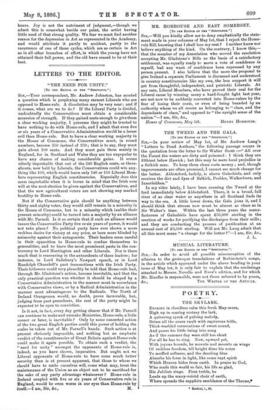LETTERS TO THE EDITOR.
"THE NEED FOR UNITY."
[To T/IR EDITOR OF TEl " SPRCTLTOR.”) SIR,—Your correspondent, Mr. Andrew Johnston, has mooted a question which is perplexing many earnest Liberals who are opposed to Home-rule. A dissolution may be very near ; and if it comes, what are we to do If the Liberal Party is divided, undoubtedly the Conservatives must obtain a considerable accession of strength. If they gained seats enough to give them a clear working majority, I presume they might be trusted to have nothing to do with Home-rule, and I admit that even five -or six years of a Conservative Administration would be a lesser evil than Home-rule. But to have a clear working majority in the House of Commons, the Conservatives must, in round numbers, become 350 instead of 250; that is to say, they must gain about 100 seats. And they must gain them mainly in England, for in Scotland and Wales they are too unpopular to have any chance of making considerable gains. It seems utterly improbable that out of the 240 English seats, or there- abouts, now held by Liberals, the Conservatives could win any- thing like 100, which would leave only 140 or 150 Liberal Mem- bers representing English constituencies. Especially does this seem improbable when it is borne in mind that the Irish vote will at the next election be given against the Conservatives, and that the new agricultural voters are not showing any marked hostility to Home-rule.
But if the Conservative gain should be anything between thirty and eighty votes, they would still remain in a minority in the House of Commons, bat in a minority which (unlike their present minority) could be turned into a majority by an alliance with Mr. Parnell. Is it so certain that if such an alliance would insure the Conservative Party five or six years of power, it would not take place ? No political party have ever shown a more reckless desire for victory at any price, or been more blinded by animosity against their antagonists. Their leaders seem careful in their opposition to Home-rule to confine themselves to generalities, and to leave the most prominent parts in the con- troversy to Lord Hartington and other Liberals. Nor is there much that is reassuring in the antecedents of these leaders; for instance, in Lord Salisbury's Newport speech, or in Lord Randolph Churchill's past transactions with the Irish Party. Their followers could very plausibly be told that Home-rule had, through Mr. Gladstone's action, become inevitable, and that the only practical question was whether it should be shaped by a 'Conservative Administration in the manner most in accordance with Conservative views, or by a Radical Administration in the manner most advantageous to the Radicals. The North of Ireland Orangemen would, no doubt, prove inexorable, but, judging from past precedents, the rest of the party might be expected to be open to conviction.
Is it not, in fact, every day getting clearer that if Mr. Parnell can continue to make and unmake Ministries, Home-rule, a little sooner or later, is inevitable ? Only by some concerted action -of the two great English parties could this power of holding the scales be taken out of Mr. Parnell's hands. Such action is at present obviously impossible, and nothing but an emphatic verdict of the constituencies of Great Britain against Home-rule could make it again possible. To obtain such a verdict, the "need for unity" amongst the opponents of Home-rule is, indeed, as you have shown, imperative. But ought not we Liberal opponents of Home-rule to have some much better security than is at present apparent, that those to whom we
should have to unite ourselves will, come what may, treat the maintenance of the Union as an object not to be sacrificed for the sake of any party advantage whatsoever ? Home-rule in Ireland coupled with five or six years of Conservative rule in England, would be even worse in our eyes than Home-rule by














































 Previous page
Previous page